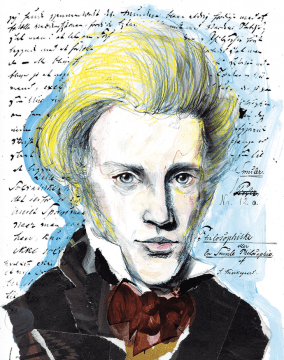Christopher Beha in Harper’s Magazine:
 Throughout its history, philosophy has been marked by figures who sought to demolish the prevailing intellectual systems of their moment—to practice “philosophy with a hammer,” as Friedrich Nietzsche put it—in order to look with fresh eyes at the most urgent human problems. As depicted in Plato’s early dialogues, Socrates railed against professional Sophists who charged fees to engage in what amounted to rhetorical games. By contrast, he merely wandered the agora, posing pointed questions about life’s meaning to anyone who’d listen. He insisted that he had no new knowledge to impart: his wisdom lay entirely in recognizing his own ignorance. He devoted his energy to unsettling commonly held beliefs rather than imposing his own, and he spoke of himself as an annoyance, a gadfly stinging a complacent Athenian society. To much of that society he was a laughingstock, but he also attracted a substantial following, for whom his personal example—his ironic temperament; his embrace of poverty and his detachment from worldly matters; and, especially, his equanimity in the face of death—signified at least as much as the content of his thought.
Throughout its history, philosophy has been marked by figures who sought to demolish the prevailing intellectual systems of their moment—to practice “philosophy with a hammer,” as Friedrich Nietzsche put it—in order to look with fresh eyes at the most urgent human problems. As depicted in Plato’s early dialogues, Socrates railed against professional Sophists who charged fees to engage in what amounted to rhetorical games. By contrast, he merely wandered the agora, posing pointed questions about life’s meaning to anyone who’d listen. He insisted that he had no new knowledge to impart: his wisdom lay entirely in recognizing his own ignorance. He devoted his energy to unsettling commonly held beliefs rather than imposing his own, and he spoke of himself as an annoyance, a gadfly stinging a complacent Athenian society. To much of that society he was a laughingstock, but he also attracted a substantial following, for whom his personal example—his ironic temperament; his embrace of poverty and his detachment from worldly matters; and, especially, his equanimity in the face of death—signified at least as much as the content of his thought.
Ever since, outsider-philosophers have tended to take Socrates as their touchstone. Like Plato, they have blurred the line between philosophical and literary writing, and they have shown a talent for the kind of aphoristic insight that the general public has come to expect from philosophers. While often hostile toward religion, they have all been deeply concerned with what we might call “God questions”: Does one exist? And what should such existence or nonexistence actually mean for us here on earth? They have had ambiguous or outright adversarial relationships with the academy, and they have often been ignored in their lifetimes or treated as objects of ridicule. In defiance of a discipline that prizes disinterest and objectivity, they have openly acknowledged the connection between their ideas and their experience. A striking proportion have died young, and they are often remembered more for their attempts to authentically live out their philosophies than for the philosophies themselves. As the field has become increasingly specialized and systematized in the modern era, these figures have stood out more conspicuously, coming to represent a tradition of their own.
More here.
